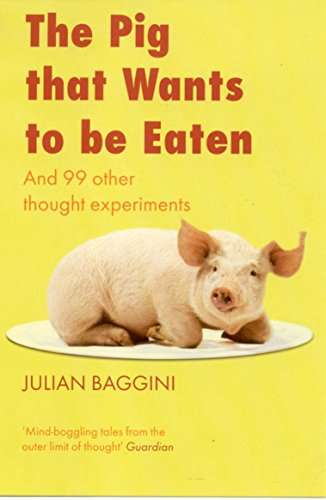
The Pig That Wants to be Eaten: And 99 Other Thought Experiments (Philosophy)
Check my rate
| Main centres: | 1-3 business days |
| Regional areas: | 3-4 business days |
| Remote areas: | 3-5 business days |

| Main centres: | 1-3 business days |
| Regional areas: | 3-4 business days |
| Remote areas: | 3-5 business days |
Published by GRANTA BOOKS, 2006, softcover, ind4ex, 306 pages, condition: slight crease to cover, otherwise condition: as new.
This book introduces 100 thought experiments in philosophy. Imagination without reason is mere fancy, but reason without imagination is sterile. That is partly why scientists and philosophers alike have always used imaginary scenarios to help sharpen their ideas and push them to their limits. The purpose of such thought experiments is to strip away the things that complicate matters in real life in order to focus clearly on the essence of a problem.
The author deals with real-life ethical dilemmas. Is eating meat morally wrong? What if an animal like a pig could be genetically engineered to give consent and says that it actually wants to be eaten? Or imagine a chicken that comes from a genetically modified bird which has been decerebrated. In other words, it lives the life of a vegetable, with no awareness of self, environment, pain or pleasure. Is killing it no more barbarous than uprooting a carrot?
Can a god be all-loving and still allow excessive suffering and pain? Could God have made a world in which there was less suffering but in which we had the same opportunities to exercise our free will?
What is the source of our knowledge? Do we learn about the world through appearances? Is there something more fundamental that we don't have access to? Do we have to be skeptical about everything? Can we be certain about our knowledge?
Do we have free will? Does free will require that we escape the physical causal chain altogether? Can we do that? Is freedom the ability to do what we choose, irrespective of what has happened up until the moment of the choice?
This book tries to answer some of these questions and more.
See also
https://www.bobshop.co.za/duck-that-won-the-lottery-and-99-other-bad-arguments/p/628497679